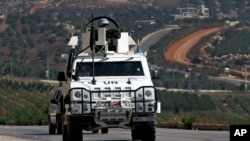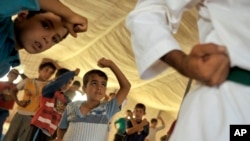BEIRUT —
Lebanon is tense as Western-backed strikes against neighboring Syria loom.
With the U.S. intervention in Iraq a decade ago still on many Lebanese minds, the thought of an American-orchestrated military attack on Syria has many in Beirut on edge.
On a windy side street in the Lebanese capital, Samira Srour sat with her teenage daughter outside the building where she worked.
There have been so many victims in Syria, she said of that civil war, so many dead children. She said something must be done, even though it was not clear, in every case, exactly who was at fault.
Up the hill, at a popular outdoor café, two local architects drank coffee and orange juice.
Elias Faouz said Syrian President Bashar al-Assad may - as the U.S. maintained - be guilty of ordering the attack last week that killed hundreds of Syrians in a Damascus suburb.
But U.S. strikes on Syrian targets, he said, would not help rebels take over Syria, and the consequences for the region could be disastrous.
“We are afraid that bombing Syria will cause a flow of new refugees in Lebanon, for example, as one," said Faouz. Two, what if someone strikes back from Syria or the allies of Syria? Will it stay on the Syrian scale, or will it expand to the regional scale?”
Lebanon has suffered greatly from the fallout of Syria's war. Sectarian violence and bombings have rocked Beirut and other cities the length of the country.
The U.N. refugee agency said more than 700,000 Syrians fleeing their war were now in Lebanon - a big addition for a country of fewer than 5 million people.
While Elias talks, an argument broke out in the street over a minor traffic accident. His colleague, Roye Dagher, said a U.S. attack on Syria, would make divisions worse in an already deeply polarized country.
“Let the Syrian people choose what they want and let the powerful win," said Dagher. "Why should they [the Americans] interfere?”
But not everyone in Beirut agreed.
Down the street, Ahmed Sheikh, a 60-year-old chauffeur, said a lack of action by the international community could be even more dangerous than a strike against the Assad government.
Sheikh said he feared the U.S. would not keep its word and take direct action to stop use of chemical weapons, and that this would result in the war in Syria spiraling into Lebanon and beyond.
Some Beirutis just do not want to talk about the war in Syria at all - not because they are afraid that voicing their opinions will cause trouble. They said they were simply tired of always being afraid.
Gallery of recent images of Syrian refugees
With the U.S. intervention in Iraq a decade ago still on many Lebanese minds, the thought of an American-orchestrated military attack on Syria has many in Beirut on edge.
On a windy side street in the Lebanese capital, Samira Srour sat with her teenage daughter outside the building where she worked.
There have been so many victims in Syria, she said of that civil war, so many dead children. She said something must be done, even though it was not clear, in every case, exactly who was at fault.
Up the hill, at a popular outdoor café, two local architects drank coffee and orange juice.
Elias Faouz said Syrian President Bashar al-Assad may - as the U.S. maintained - be guilty of ordering the attack last week that killed hundreds of Syrians in a Damascus suburb.
But U.S. strikes on Syrian targets, he said, would not help rebels take over Syria, and the consequences for the region could be disastrous.
“We are afraid that bombing Syria will cause a flow of new refugees in Lebanon, for example, as one," said Faouz. Two, what if someone strikes back from Syria or the allies of Syria? Will it stay on the Syrian scale, or will it expand to the regional scale?”
Lebanon has suffered greatly from the fallout of Syria's war. Sectarian violence and bombings have rocked Beirut and other cities the length of the country.
The U.N. refugee agency said more than 700,000 Syrians fleeing their war were now in Lebanon - a big addition for a country of fewer than 5 million people.
While Elias talks, an argument broke out in the street over a minor traffic accident. His colleague, Roye Dagher, said a U.S. attack on Syria, would make divisions worse in an already deeply polarized country.
“Let the Syrian people choose what they want and let the powerful win," said Dagher. "Why should they [the Americans] interfere?”
But not everyone in Beirut agreed.
Down the street, Ahmed Sheikh, a 60-year-old chauffeur, said a lack of action by the international community could be even more dangerous than a strike against the Assad government.
Sheikh said he feared the U.S. would not keep its word and take direct action to stop use of chemical weapons, and that this would result in the war in Syria spiraling into Lebanon and beyond.
Some Beirutis just do not want to talk about the war in Syria at all - not because they are afraid that voicing their opinions will cause trouble. They said they were simply tired of always being afraid.
Gallery of recent images of Syrian refugees














